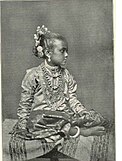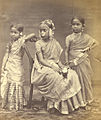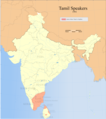Portal:Tamils
The Tamils portal
The Tamil people, also known as Tamilar (Tamil: தமிழர், romanized: Tamiḻar, pronounced [t̪amiɻaɾ] in the singular or தமிழர்கள், Tamiḻarkaḷ, [t̪amiɻaɾɡaɭ] in the plural), Tamilians, or simply Tamils (/ˈtæmɪlz, ˈtɑː-/ TAM-ilz, TAHM-), are a Dravidian ethnolinguistic group who natively speak the Tamil language and trace their ancestry mainly to India's southern state of Tamil Nadu, to the union territory of Puducherry, and to Sri Lanka. The Tamil language is one of the world's longest-surviving classical languages, with over 2000 years of Tamil literature, including the Sangam poems, which were composed between 300 BCE and 300 CE. People who speak Tamil as their mother tongue and are born in are considered Tamils.
Tamils constitute 5.9% of the population in India (concentrated mainly in Tamil Nadu and Puducherry), 15% in Sri Lanka (excluding Eelam Moors), 7% in Malaysia, and 5% in Singapore. From the 4th century BCE, urbanisation and mercantile activity along the western and eastern coasts of Tamilakam -- what is today Kerala and Tamil Nadu -- led to the development of four large Tamil empires, the Cheras, Cholas, Pandyas, Pallavas, and velirs and a number of smaller states, all of whom were warring amongst themselves for dominance. The Jaffna Kingdom, and vanni chieftaincies inhabited by Eelam Tamils, was once one of the strongest kingdoms of Sri Lanka and controlled much of the north of the island. (Full article...) Selected article -Nagore Dargah (also called Nagoor Dargah or Syed Shahul Hameed Dargah or Nagore Andavar dargah) is a dargah built over the tomb of the Sufi saint Shahul Hameed (1490–1579 CE). It is located in Nagore, a coastal town in the South Indian state of Tamil Nadu. The outer doors of the dargah are kept open always, while the internal doors are open from 4:00 am to 07:00 am and from 6:00 pm to 10:00 pm. On Fridays, the doors are additionally kept open between 12:00 pm and 2:30 pm. Shahul Hamid is believed to have performed many miracles in Nagore, and cured the physical affliction of king Achuthappa Nayak, a 16th-century Hindu ruler of Thanjavur. He is locally referred to as Nagore Andavar, meaning the "Ruler of Nagore" and Qadir wali baba. Nagore dargah as it stands now, is believed to have been built by ardent devotees of Shahul Hamid, with major contribution from Hindus. There are five minarets in the dargah, with the Hindu Maratha ruler of Thanjavur Pratap Singh (1739–1763 CE), building the tallest minaret. The dargah is a major pilgrimage centre that attracts pilgrims from both sufi Islam and Hinduism, symbolizing peaceful coexistence between the two religions. The most prominent event celebrated at Nagore Dargah is the Kanduri festival (Urus Mubarak), a fourteen-day commemoration of the death anniversary of Shahul Hamid. Common worship practices at Nagore dargah include the presentation of offerings, accompanied by the playing of musical instruments like nadaswaram, typical of Hindu religious tradition. The Shifa Gunta, a pool within the precincts of the dargah, is considered sacred; pilgrims take a holy dip in it. The hereditary board of trustees performs all the official and religious duties of the dargah. The governance and upkeep of the dargah are overseen by an 11-member board of trustees, which operates under a court-decreed scheme established by the Madras High Court. (Full article...)General imagesSelected biography -Muthuvel Karunanidhi (3 June 1924 – 7 August 2018) was an Indian writer and politician who served as Chief Minister of Tamil Nadu for almost two decades over five terms between 1969 and 2011. He is popularly referred to as Kalaignar (Artist) and Mutthamizh Arignar (Tamil Scholar) for his contributions to Tamil literature. He had the longest intermittent tenure as Chief Minister of Tamil Nadu with 6,863 days in office. He was also a long-standing leader of the Dravidian movement and ten-time president of the Dravida Munnetra Kazhagam political party. Karunanidhi has the record of never losing an election to the Tamil Nadu Assembly, having won 13 times since his first victory in 1957. Before entering politics, he worked in the Tamil film industry as a screenwriter. He also made contributions to Tamil literature, having written stories, plays, novels, and a multiple-volume memoir. Karunanidhi died on 7 August 2018 at Kauvery Hospital in Chennai after a series of prolonged, age-related illnesses. Karunanidhi was born in the Tamil Nadu village of Thirukkuvalai on 3 June 1924. His parents were from the Isai Vellalar caste, a caste of musicians that perform at temples and other social gatherings. Growing up in a caste-ridden culture, Karunanidhi was learned about the crippling circumstances that arose from being born into a low caste. When he was 14, he formed a student movement against the imposition of Hindi as India's national language during the Anti-Hindi agitation of 1937–40. This served as a forerunner to Karunanidhi's wider anti-Hindi demonstrations in 1965. As a high school student, Karunanidhi created the Tamil Nadu Tamil Manavar Mandram, the Dravidian Movement's first student wing. He also started a news paper during his school days, which grew into the Murasoli, the DMK's official publication. Karunanidhi began participating in theatrical productions at a young age, including composing plays. Later on, he started writing for movies. As a writer, he wrote screenplays, historical novels, screenplays, biographies, poems and novels. He utilised his writing to propagate reformist ideals effectively. He wrote the script and dialogue for M.G. Ramachandran's (MGR) maiden film as a hero, Rajakumari. He also composed the dialogue for Sivaji Ganesan's debut film, Parasakthi. He was critical of organised religion and superstition. He was an atheist and a self-described rationalist. (Full article...)CategoriesTopicsTamil People Countrywide: India • Sri Lanka • Canada • Malaysia • Singapore • South Africa • England Related Ethnic Groups: Brahui • Gond • Kannadiga • Khonds • Kodava • Oraon • Malayali • Telugus • Tuluvas Related indigenous Groups: Badagas • Toda • Kuruba
See also: List of Tamil people, Tamil script, Tamil Script Code for Information Interchange Related portalsWikiProjectsThings to do
Associated WikimediaThe following Wikimedia Foundation sister projects provide more on this subject:
Discover Wikipedia using portals |
































































